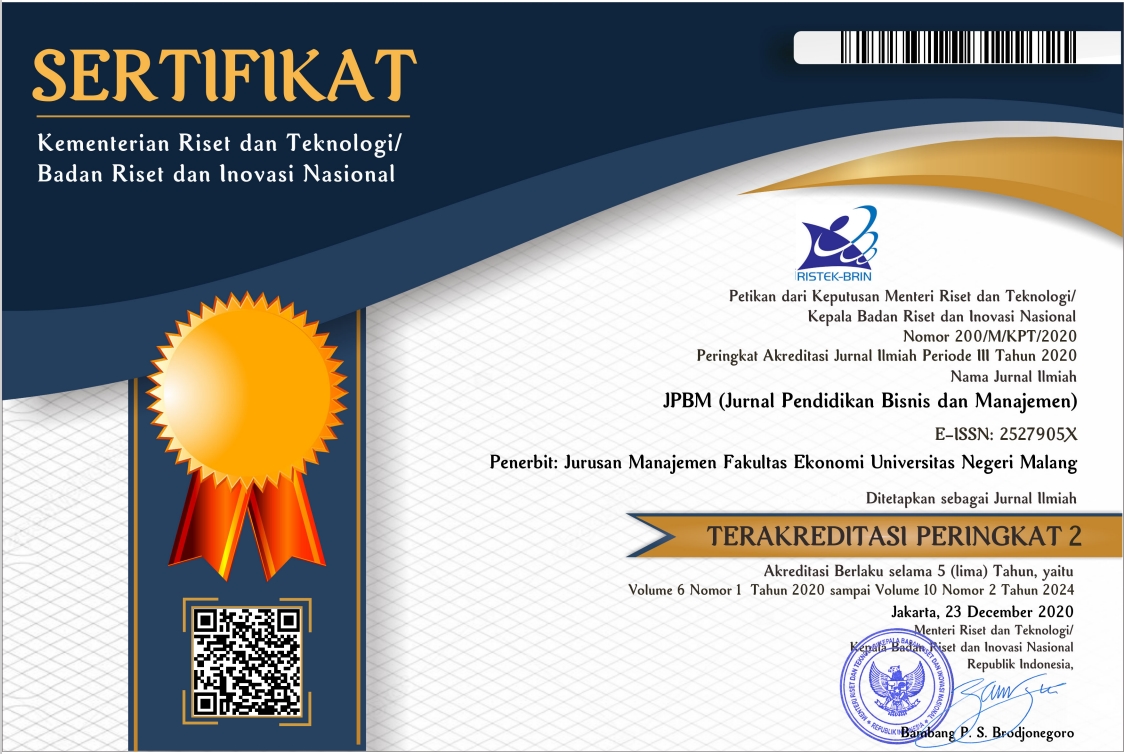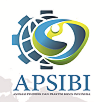Educational Policy : The Art Of Decision Making For Economics Student Internship Program
Abstract
This study aims to evaluate the Internship Program which is required by Faculty of Economics and find out the extent of success of the Internship Program in order to develop human skills, and formulate policy recommendations to improve such activities in the future. This research uses descriptive deductive method and model evaluation of the Context-Input-Process-Product ( CIPP ) program. From the research result, it is found that implementation in context, input, process and product aspects has been done with various results. There are 6 issues of strategic issues raised based on interviews that are considered to be considered in regard to the internship program. Researchers also give 6 policy recommendations to be implemented by the faculty that will impact on the human development of the world of education in general.
Keywords
Full Text:
PDFReferences
Arikunto, Arikunto (2012). Fundamentals of Educational Evaluation, Second Edition. Jakarta: Earth Literacy .
Arikunto, S and Jabar (2007). Evaluation of Education Program. Revised edition. Jakarta: Earth Literacy.
Chen, T., Shen, C., Gosling, M., 2018. Does employability increase with internship satisfaction? Enhanced employability and internship satisfaction in a hospitality program. J. Hosp. Leis. Sport Tour. Educ. 22, 88–99. https://doi.org/10.1016/j.jhlste.2018.04.001
Dombrowski, R.F., Smith, K.J., Wood, B.G., 2013. Bridging the education-practice divide: The Salisbury University auditing internship program. J. Account.
Educ. 31, 84–106. https://doi.org/10.1016/j.jaccedu.2012.12.003.
Gajda, Rebecca &Jennifer Jewiss (2004). Thinking about howto evaluate your program?thesestrategies will get you started. Practical Assessment, Research &Evaluation, 9(8). Available online: http://PAREonline.net/getvn.asp?v=9&n=8.
Hamidah, H., Maziah, M., Ayesha, B., Subahan, T., Rahayah, A.S., 2012. The
Development of a Malaysian Model Internship Programme (MyMIP): A Preceptor Model for Nurses in their Early Stage of Profession. Procedia - Soc.
Behav. Sci., 12 th International Educational Technology Conference - IETC
64, 492–500. https://doi.org/10.1016/j.sbspro.2012.11.058
Kelly, M.A., Hayes, C., Abdipranoto, A., 2017. Need a Simulation Technician? Try Your University’s Engineering Internship Program. Clin. Simul. Nurs. 13, 245–
https://doi.org/10.1016/j.ecns.2017.02.005
Khalil, O.E.M., 2015. Students’ experiences with the business internship program at Kuwait University. Int. J. Manag. Educ. 13, 202–217. https://doi.org/10.1016/j.ijme.2015.05.003
Lam, T., Ching, L., 2007. An exploratory study of an internship program: The case of Hong Kong students. Int. J. Hosp. Manag., Special Issue on Self-Catering
Accommodations 26, 336–351. https://doi.org/10.1016/j.ijhm.2006.01.001.
Nugroho, Riant (2009). Public Policy , Jakarta: Elex Media Komputindo.
Peterson, Steven and Albert Somit (2003). Human Nature and Public Policy: An Evolutionary Approach , Palgrave Macmillan .
Scriven, M (1991). Evaluation Thesaurus 4 th,. Newbury Park, CA: Sage Publication .
Setiawan, Beni (1999). National Education Agenda. Yogjakarta: Ar-Ruz Media.
Steward , Jr. Joseph and James P. Lester (2000). Public Policy: An Evolutionary Approach, 2nd ed., Belmont, CA.
Stufflebeam, Daniel L. and Chris LS Coryn (2014). Evaluation Theory, Models, & Applications , San Francisco: Jossey Bass.
Szafran, Robert F. (2007). Assessing Program Outcomes When Participation Is Voluntary: Getting More Out of a Static-Group Comparison. Practical Assessment Research & Evaluation, 12(8). Available online:
http://pareonline.net/getvn.asp?v=12&n=8
Tayibnapis, Farida Yusuf (2000). Program Evaluation. Jakarta: Rineka Cipta.
Wirawan (2011). Evaluation: Theory, Model, Standard, Application, and
Profession. Rajawali Press.
DOI: http://dx.doi.org/10.17977/um003v5i32019p127
Refbacks
- There are currently no refbacks.
JPBM (Jurnal Pendidikan dan Bisnis Manajemen) is licensed under a Creative Commons Attribution-NonCommercial-ShareAlike 4.0 International License.
JPBM (Jurnal Pendidikan dan Bisnis Manajemen) is abstracted and indexed in :
















